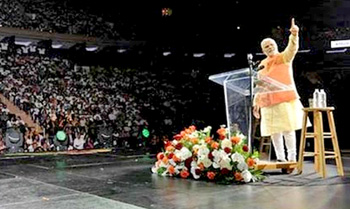New York, Sept 29: Prime Minister Narendra Modi on Sunday told a rapturous crowd of NRIs that Persons of Indian Origin (PIO) cardholders will get lifetime Indian visa and that American tourists will be given visa on arrival.

He announced that PIO cardholders staying in India on long-term basis will no longer have to report to the local police station.
At the unique event in the heart of Manhattan attended by some 20,000 cheering NRIs, Modi said that his big win in the Lok Sabha elections had come with a big responsibility for him which he would fulfil. Modi affirmed that India will move ahead at a rapid pace and lead the 21st century world.
Listing out India's advantages, the prime minister said that its three strengths were democracy, demographic dividend in which 65 per cent of its population was under 35 years, and the demand for India because it was a huge market. “My effort is to make development a mass movement. I am confident that we will succeed. This country is going to make rapid progress.
“There are many expectations from the new government. This government will be 100 per cent successful in fulfilling the aspirations of people,” he said amid loud cheers.
“My dream is to see every Indian family has a home by 2022,” he said.
Clearly with an eye on the younger generation, Modi said, “We will not do anything which will let you down.”
Attired in a saffron Nehru jacket and yellow kurta, the prime minister held the packed indoor stadium spellbound, asserting that “our attempt is to make development a people's movement.”
In his 75-minute-long speech in Hindi which he began with “Bharat Mata Ki Jai” while extending greetings for Navratri festival, Modi promised good governance, saying that after a gap of 30 years India has got a government at the Centre with a clear majority.
He also had a jibe at poll predictions in the run-up to the Lok Sabha elections. “No political pundit or opinion-maker could fathom such a verdict,” he said.
“Winning elections is not about any post or chair. It's a responsibility. Since taking over (as prime minister), I have not even taken a 15-minute vacation,” he said.
“You may not have voted in 2014 but I am sure that when the results were coming, you didn't sleep and you all celebrated,” he told the NRIs.
Promising a fast pace of development, Modi said, “There is no reason to be disappointed. India will progress very fast and the skills of our youth will take India ahead.”






Comments
It is really a great piece of information.
Add new comment